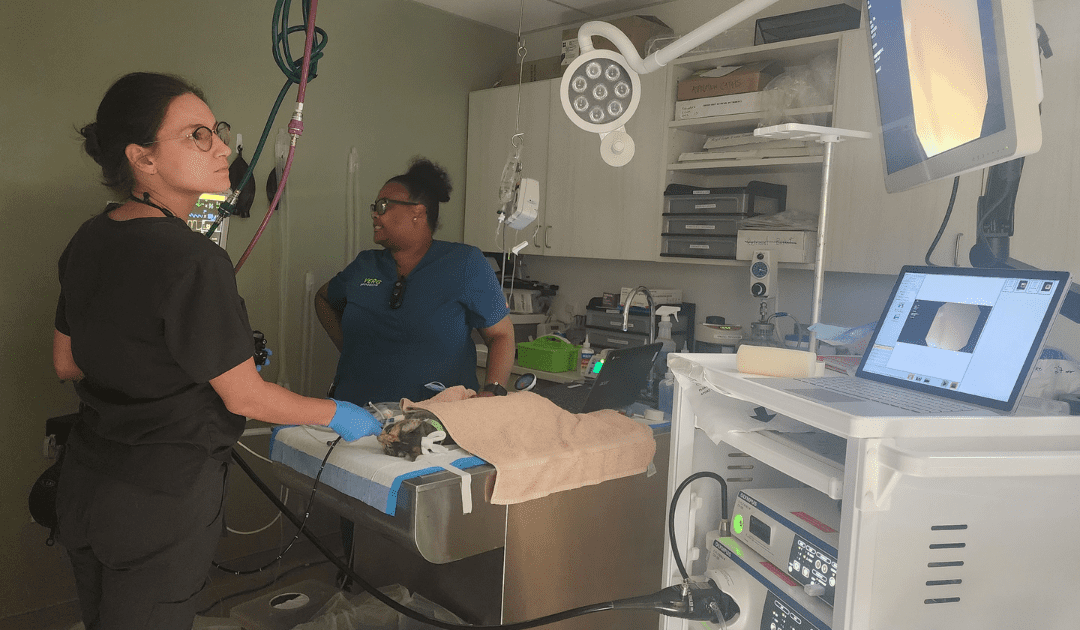What does a Veterinary Internal Medicine Specialist Do, and When Does My Pet Need One?
Internal Medicine Veterinarians or Internists are board-certified specialists trained to help pets with multiple chronic conditions, solve complex diagnostic problems, and manage long-term illnesses. Their training uniquely allows them to manage these complex illnesses and help pets live their best lives.
What’s the difference between a Primary Care Veterinarian and an Internal Medicine Specialist?
Most primary care veterinarians attend 4 years of undergraduate studies and 4 years of veterinary school. Internal medicine specialists do the same, plus a year of internship followed by a three-year internal medicine residency. An internist must also pass two sets of rigorous board examinations administered by the American College of Veterinary Internal Medicine and publish in a respected medical journal in addition to this specialized training.
Why does my pet need to see an Internal Medicine specialist?
Your pet may be referred to our internal medicine department if your primary veterinarian suspects that an underlying internal issue requires further investigation or if the expertise of a specialist is necessary to effectively manage your pet’s condition. Much like in humans, Internal medicine specialists often care for pets with multiple concurrent disease processes.
Some common illnesses we diagnose and treat:
- Chronic gastrointestinal disease
- Kidney disease
- Liver disease
- Diabetes and other hormonal imbalances
- Respiratory Disease
- Autoimmune diseases
Referral to an internal medicine specialist is a decision best made by you and your pet’s primary care veterinarian to ensure continuity of care.
Advanced Diagnostics for Pets
Since pets can develop complex illnesses just like their humans do, at VERG Brooklyn, we utilize some of the same advanced medical equipment and tools used in human hospitals to diagnose and treat your pet.
One of these tools is endoscopy which is a minimally invasive procedure that allows our internists to view the inside of our pet patient’s body. Endoscopy can be both diagnostic, meaning that the samples are collected to help diagnose your pet’s illness, or therapeutic, like the removal of foreign material from the gastrointestinal tract or respiratory tract. Common endoscopic procedures performed by our internal medicine team include gastroduodenoscopy (evaluation of the upper GI tract), rhinoscopy (endoscopy of the nose), colonoscopy (endoscopy of the lower GI tract), and tracheobronchoscopy (endoscopy of the trachea and lower airways). This is in combination with advanced imaging techniques such as CT, MRI, and ultrasound.
In addition, our hospital boasts an in-house veterinary lab stocked with the equipment required to promptly and properly identify your pet’s internal medicine issue so that treatment may begin swiftly. Diagnostic samples are also sent to labs across the country to provide a more comprehensive picture of your pet’s illness.
In summary, internists serve as an extension of your primary veterinary team and provide specialized care when your pet’s need it most. If you have concerns about your pet’s health or if your primary care veterinarian refers them to an internal medicine veterinarian, contact us to schedule a consultation with our experienced team.
Meet The Internal Medicine Team
Our board-certified Internal Medicine specialists, Dr. Alysa Cook and Dr. Elena Pavlova, along with the entire Internal Medicine Team at VERG Brooklyn, are here to help if you have questions regarding your pet’s health. At your pet’s appointment, we will carefully evaluate your pet’s clinical picture, develop a course of treatment, and tailor that treatment plan to best suit their needs. If you ever have questions or need help following your pet’s appointment, please don’t hesitate to contact our dedicated team at 718-522-9400. We are happy to help.

